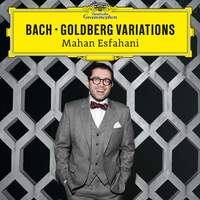Recording of the Week,
Bach's Goldberg Variations from harpsichordist Mahan Esfahani
The term “harpsichord star” may sound a little strange in an age where pianists, violinists, cellists and vocalists rule the classical roost, but if anyone merits that title it’s Mahan Esfahani – a rising young harpsichordist who has always been at pains to stress the instrument’s modernity as well as its links to the past, recording harpsichord works by Poulenc, Górecki and Ligeti alongside the more conventional Corelli, Rameau and CPE Bach.

This interest in modern writing for the harpsichord had led some of us to despair of Esfahani ever giving us his take on some of Bach’s major works, so there was a palpable sense of “at LAST!” here at Presto when we heard that he was recording the Goldberg Variations with DG. Now, finally, we can hear what one of today’s most exciting keyboard players does with Bach’s masterwork.
While disdainful of the kind of quasi-Qabbalistic cryptographical navel-gazing that the Goldbergs have sometimes inspired in scholars, Esfahani certainly draws numerous programmatic comparisons in his notes – hearing echoes of a Passion chorale here, a wind trio there and even linking some of the variations to Dante’s Inferno. Whatever one thinks of those images (such things are surely very subjective in cases like these), this is certainly a very pictorial set of Goldbergs. Uncluttered by excessive ornamentation and meticulously clear in phrasing (the neatness of the inner parts in Variation 16 is particularly noticeable), they demonstrate the sheer breadth of Esfahani’s musical palette.
In some movements the mood is richly melancholy, with Esfahani clearly having something of the organist’s technique about his fingerwork, producing a sustained tone (in Variations 2, 3 and 9 especially) that utterly dispels the schoolroom notion that the harpsichord is limited to detached sonorities. The next moment he may take us into more majestic realms, with the welcome addition of the octave coupler giving strength to the more pompous movements (notably Variations 4, 10, 22 and 29). Or he may decide to showcase his effortlessly virtuosic passagework – the running scales in Variations 5 and 20 seemingly the easiest thing in the world – again demonstrating a fineness of touch as he carefully brings out the melody from the cascade of notes.
Elsewhere we are treated to moments that are flamboyantly theatrical – Variation 16 starts with an unrepentantly ringing “clang” of a chord and pulls no punches, while the lute stop (always a favourite touch of mine) makes a welcome appearance in Variation 19, and in Variations 9 and 25 it feels like Esfahani is pushing the limits of how slowly he can play and still have the music hang together.
It’s an enormously colourful, varied journey, and “journey” definitely seems like the right term to use. When the Aria da capo comes round to finish the set, there’s a sense somehow that Esfahani is returning home, tired but happy after a long and scenic walk. Perhaps the very last appoggiatura is just a little indulgent in its suspension (as can be the case in the final bar of the St Matthew Passion), but after the vigorous musical workout of the preceding hour maybe a little indulgence has been earned!
Musical history abounds with examples of people who avoided tackling certain major milestones until they were ready. Beethoven with his first string quartet, Brahms with his first symphony – perhaps Esfahani has done the same in making us wait for his Goldbergs. Whatever the reason, it’s been well worth the wait; whatever your go-to recording of the Variations, I think this one can give it a run for its money. Now, about that Well-Tempered Clavier…!
Mahan Esfahani (harpsichord)
Available Formats: MP3, FLAC, Hi-Res FLAC



